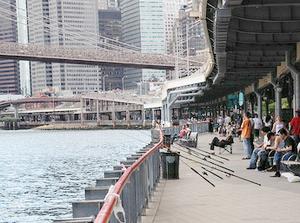New York City Prepares for Higher Temperatures, Rising Sea Levels
NEW YORK, New York, February 18, 2009 (ENS) - As a low-lying coastal city, New York will face higher temperatures and more rapidly rising sea levels, as well as more frequent and intense extreme weather events - like heat waves, heavy rainstorms, and coastal flooding - over the course of the century as a result of global warming, according to a new report released Tuesday by Mayor Michael Bloomberg.
The climate change projections specific to New York City were developed by the New York City Panel on Climate Change, made up climate change scientists, academics, and private sector practitioners convened by the mayor and funded by a $350,000 grant from the Rockefeller Foundation.
"The climate change projections developed by our expert panel put numbers to what we already know - climate change is real and could have serious consequences for New York if we don't take action," said Mayor Bloomberg.
The report will be used to inform the actions of the city's Climate Change Adaptation Task Force, which includes 38 city, state, and federal agencies, regional public authorities, and private companies that operate, maintain and regulate critical infrastructure in New York City.
"The projections developed by the NPCC will be used by our Adaptation Task Force to create a plan to protect the city's critical infrastructure and will inform other city efforts to adapt to climate change," said the mayor.
"Planning for climate change today is less expensive than rebuilding an entire network after a catastrophe," he said. "We cannot wait until after our infrastructure has been compromised to begin to plan for the effects of climate change now."
 |
Spring comes to Manhattan's East River walk, which could be flooded by rising sea levels. (Photo by Scott Moulaison) |
The report was released at the Department of Environmental Protection's Rockaway Wastewater Treatment Plant, which is preparing for the effects of climate change by raising electrical equipment, such as pump motors, circuit breakers, and controls, to higher elevations.
"There is a growing recognition of the need for adaptation to climate change in urban areas, and this initiative of Mayor Bloomberg's puts New York City in the forefront of this global effort," said Dr. Cynthia Rosenzweig of the NASA Goddard Institute for Space Studies/ Columbia University Earth Institute and co-chair of the New York City Panel on Climate Change.
"In the coming decades, our coastal city will most likely face more rapidly rising sea levels and warmer temperatures, as well as potentially more droughts and floods, which will all have impacts on New York City's critical infrastructure," said Dr. William Solecki of the CUNY Institute for Sustainable Cities at Hunter College and co-chair of the NPCC. "Taking steps now to adapt to these impacts will reduce their potential consequences in the future."
Using global climate models and local information, the New York City Panel on Climate Change projects that by the end of the century New York City's mean annual temperatures projected to increase by 4 to 7.5 degrees Fahrenheit.
The total number of days with a maximum temperature over 90 or 100 degrees Fahrenheit, is expected to increase as the 21st century progresses. The frequency and duration of heat waves, defined as three or more consecutive days with maximum temperatures above 90 degrees Fahrenheit, are also expected to increase. In contrast, the number of days per year with minimum temperature below 32 degrees Fahrenheit, are expected to become rarer.
Annual precipitation is also projected to increase by five to 10 percent, and sea levels are projected to rise by 12 to 23 inches.
Recent evidence, however, including accelerated ice melt in Greenland and Antarctica, suggests that sea levels could rise at a faster rate than projected by the existing models - potentially to 41 to 55 inches by the end of the century.
While this "rapid ice-melt" scenario does not have the same level of confidence associated with it as those developed by the global climate models, the New York City Panel on Climate Change included it in their projections given the large impact it would have on the city should it occur.
While the focus of the panel's work is New York City, the climate change projections it developed are generally applicable for the greater New York City metropolitan region.
Click here to download the New York City Panel on Climate Change report.
Copyright Environment News Service (ENS) 2009. All rights reserved.
To subscribe or visit go to: http://www.ens-newswire.com